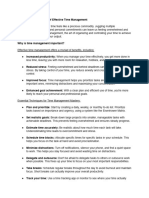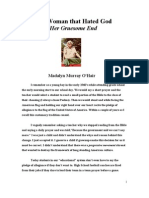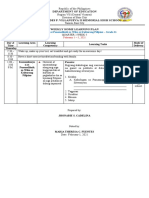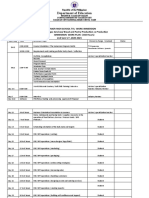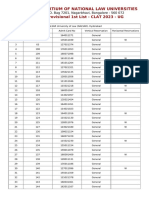The Importance of Time Management
Time is one of the most valuable resources a person can have. Effective time management allows
individuals to accomplish more with less stress. Prioritizing tasks helps in maintaining a balanced
life. Without proper time management, people may feel overwhelmed and unproductive. Learning to
use time wisely leads to greater success.
Setting clear goals is essential for managing time efficiently. Goals provide direction and motivation
to complete tasks. They help in identifying what is important and what can be set aside. Short-term
and long-term goals give a sense of purpose. Achieving goals requires discipline and consistent
effort.
Planning ahead prevents last-minute stress and poor decision-making. Creating a daily schedule
ensures that tasks are completed on time. A structured plan increases productivity and reduces
procrastination. Time management tools such as planners and apps help in organizing
responsibilities. A well-planned day leads to a more productive life.
Procrastination is a major obstacle to effective time management. Delaying tasks often leads to
rushed work and lower-quality results. Identifying the reasons behind procrastination helps in
overcoming it. Breaking tasks into smaller steps makes them more manageable. Staying focused
and eliminating distractions improves efficiency.
Balancing work, study, and personal life is crucial for overall well-being. Overworking can lead to
stress and burnout. Allocating time for rest and recreation enhances productivity. A balanced routine
ensures both professional and personal growth. Managing time effectively allows for a fulfilling life.
Prioritization helps in managing time effectively. Not all tasks have the same level of importance or
urgency. The Eisenhower Matrix is a useful tool for categorizing tasks. Focusing on important and
urgent tasks first increases efficiency. Eliminating or delegating less critical tasks saves time.
Using time effectively leads to personal and professional growth. Employers value individuals who
can manage time well. Time management skills improve performance and increase opportunities for
advancement. People who use time wisely achieve more in their careers. Good time management
reflects discipline and responsibility.
Technology can be both a help and a distraction in time management. Productivity apps assist in
organizing tasks and setting reminders. However, excessive social media use can waste valuable
time. Setting limits on screen time improves focus and efficiency. Using technology wisely enhances
time management skills.
�Self-discipline plays a significant role in managing time effectively. Developing good habits such as
waking up early and staying organized helps. Consistency in time management leads to long-term
success. People who respect their time and others' time build strong relationships. Being punctual
and reliable earns trust and respect.
Time is a non-renewable resource, making its management crucial. Learning to manage time
effectively leads to a more fulfilling and productive life. Every minute spent wisely contributes to
long-term success. Developing time management skills is a lifelong process. Those who master time
management gain control over their future.







































